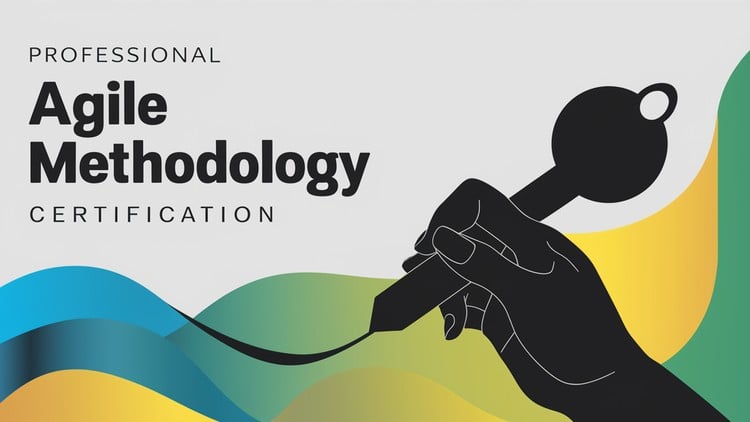
Master Agile frameworks, Scrum, Kanban & Lean principles. Enhance project management skills with real-world applications
⭐ 4.62/5 rating
👥 5,433 students
🔄 June 2025 update
Add-On Information:
“`html
Note➛ Make sure your 𝐔𝐝𝐞𝐦𝐲 cart has only this course you're going to enroll it now, Remove all other courses from the 𝐔𝐝𝐞𝐦𝐲 cart before Enrolling!
- Course Overview
- This comprehensive ‘Professional Agile Methodology Certification’ course is meticulously designed to equip aspiring and practicing professionals with a profound understanding and practical application of leading Agile frameworks.
- Beyond a mere theoretical overview, the program delves deep into the core tenets of Scrum, Kanban, and Lean principles, demonstrating their interconnectedness and synergistic potential in modern project management environments.
- Participants will embark on a transformative learning journey that cultivates adaptability, fosters collaborative team dynamics, and champions continuous improvement, all crucial for navigating the complexities of today’s dynamic business landscape.
- The course emphasizes a shift from traditional, rigid project management approaches to a more flexible, iterative, and customer-centric model, empowering individuals to deliver value rapidly and effectively.
- With a strong emphasis on real-world scenarios and best practices, this certification aims to bridge the gap between theoretical knowledge and practical implementation, ensuring graduates are job-ready and possess demonstrable Agile proficiency.
- The curriculum is continually updated, as evidenced by the June 2025 revision, reflecting the latest advancements and industry trends in Agile methodologies.
- The high average rating of 4.62/5 and the participation of over 5,433 students underscore the course’s quality, relevance, and perceived value within the professional community.
- Requirements / Prerequisites
- While no formal prior Agile certifications are mandatory, a foundational understanding of project management concepts is beneficial for a more enriching experience.
- Participants are expected to possess a willingness to engage actively in discussions, collaborative exercises, and problem-solving scenarios.
- Basic familiarity with team-based work environments and common project lifecycle stages will enhance comprehension and application of Agile principles.
- Access to a reliable internet connection and a suitable device for online learning is essential.
- A mindset geared towards embracing change, continuous learning, and iterative development is highly recommended.
- Skills Covered / Tools Used
- Agile Frameworks Mastery: In-depth exploration and practical application of Scrum (including roles, events, artifacts) and Kanban (visualizing workflow, limiting WIP, managing flow).
- Lean Principles Integration: Understanding and applying Lean concepts such as eliminating waste, value stream mapping, and continuous improvement (Kaizen).
- Iterative and Incremental Development: Proficiency in planning, executing, and delivering projects in short cycles, focusing on working increments.
- Cross-Functional Team Collaboration: Developing skills to foster effective communication, shared ownership, and collective problem-solving within Agile teams.
- Effective Backlog Management: Techniques for creating, prioritizing, and refining product backlogs to maximize value delivery.
- Daily Stand-ups and Sprint Reviews: Facilitating and participating in key Scrum events to ensure transparency and feedback loops.
- Retrospective Facilitation: Leading and participating in retrospectives to identify areas for improvement and adapt processes.
- Visual Management Techniques: Utilizing Kanban boards and other visual tools to gain clarity and control over workflow.
- Risk Management in Agile: Strategies for identifying, assessing, and mitigating risks within an Agile context.
- Stakeholder Engagement and Communication: Building strong relationships and ensuring alignment with all relevant stakeholders.
- Introduction to Agile Tools (Conceptual): While specific tool training might vary, understanding the principles behind tools like Jira, Trello, Asana, and Azure DevOps for task management and collaboration.
- Benefits / Outcomes
- Enhanced Project Success Rates: Improved ability to deliver projects on time, within budget, and to stakeholder satisfaction.
- Increased Adaptability and Resilience: Greater capacity to respond to changing requirements and market dynamics.
- Boosted Team Productivity and Morale: Cultivating a more engaged, motivated, and collaborative team environment.
- Career Advancement Opportunities: Increased employability and potential for roles such as Agile Coach, Scrum Master, Product Owner, or Agile Project Manager.
- Valuable Industry Certification: A recognized credential that validates your expertise in Agile methodologies.
- Cost and Time Efficiency: Learning to deliver value faster and reduce wasted effort, leading to significant savings.
- Improved Product Quality: Continuous feedback loops and iterative development lead to higher quality outcomes.
- Stronger Stakeholder Relationships: Enhanced transparency and collaboration foster trust and alignment.
- Contribution to a Culture of Innovation: Empowering individuals and teams to embrace experimentation and continuous improvement.
- PROS
- Industry-Recognized Certification: Highly valued in the job market.
- Comprehensive Coverage: Addresses multiple popular Agile frameworks (Scrum, Kanban, Lean).
- Practical, Real-World Focus: Emphasizes application over pure theory.
- High Student Satisfaction: Proven track record with excellent ratings and a large student base.
- Regular Updates: Curriculum keeps pace with industry evolution.
- Skill Enhancement: Develops crucial soft and hard skills for modern project management.
- CONS
- Potential for Overwhelm: The breadth of material may require dedicated study time for complete mastery.
“`
Learning Tracks: English,Development,Software Development Tools
Found It Free? Share It Fast!